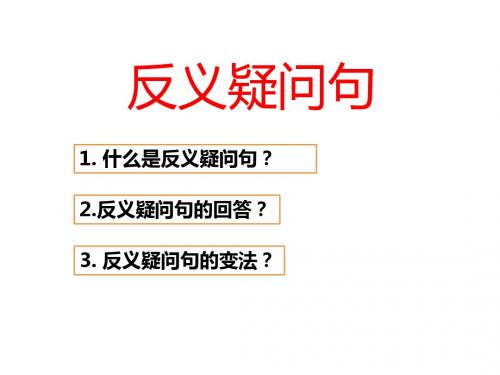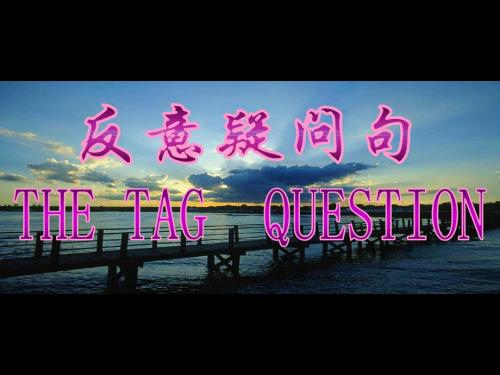反义疑问句
- 格式:doc
- 大小:61.50 KB
- 文档页数:7



反义疑问句例句20个反义疑问句是英语中常见的一种句型,它通常由两个部分组成,即一个陈述句和一个相反的疑问句。
反义疑问句在英语交流中经常被使用,因为它们可以让说话者得到更明确的答案,而且它们还有助于确认对话内容。
下面是20个常见的反义疑问句例句:1. You’re a student, aren’t you? 你是学生,不是吗?2. She doesn’t like coffee, does she? 她不喜欢咖啡,对吗?3. He’s from Germany, isn’t he? 他来自德国,是吧?4. They haven’t arrived yet, have they? 他们还没到,是吗?5. You’re not going to the party, are you? 你不去参加聚会,对吗?6. He’s not feeling well today, is he? 他今天感觉不太舒服,是吧?7. You’ve never been to Paris, have you? 你从未去过巴黎,是吗?8. It’s a beautiful day, isn’t it? 今天是个美好的日子,对吗?9. He can’t swim, can he? 他不会游泳,对吗?10. She doesn’t like pizza, does she? 她不喜欢披萨,对吗?11. You’re not afraid of heights, are you? 你不怕高,对吗?12. They won’t be able to attend the meeting, will they? 他们不能参加会议,对吗?13. They’re leaving tomorrow, aren’t they? 他们明天要走了,对吗?14. He’s never been skiing, has he? 他从未滑过雪,对吗?15. She’s not going to the concert, is she? 她不去音乐会,对吗?16. You’re not worried about the exam, are you? 你不担心考试吧,对吗?17. He didn’t eat breakfast this morning, did he? 他今天早上没吃早餐,对吗?18. They’r e not going to the beach, are they? 他们不去海边,对吗?19. You’ve already seen the movie, haven’t you? 你已经看过这部电影了,对吗?20. He’s not coming to the party, is he? 他不来参加聚会,对吗?在使用反义疑问句时,需要注意的是,它们并不总是表示对话者的不确定或疑虑。

什么是反意疑问句?反意疑问句(Tag Questions)是一种特殊的疑问句形式,用于在陈述句后面提出一个疑问,以征求对方的确认或否定。
反意疑问句通常由一个陈述句和一个疑问短语组成,疑问短语是一个与陈述句的情态动词、助动词或be 动词形式相一致的疑问词或疑问词组。
反意疑问句有两种类型:肯定反意疑问句和否定反意疑问句。
1. 肯定反意疑问句(Positive Tag Questions)肯定反意疑问句用于在陈述句后面提出一个与陈述句相反的疑问。
当陈述句是肯定形式时,反意疑问句的疑问部分通常是否定形式。
反之,当陈述句是否定形式时,反意疑问句的疑问部分通常是肯定形式。
例如:- You don't like coffee, do you?(你不喜欢咖啡,对吗?)- He is a doctor, isn't he?(他是医生,对吗?)2. 否定反意疑问句(Negative Tag Questions)否定反意疑问句用于在陈述句后面提出一个与陈述句相反的疑问。
当陈述句是肯定形式时,反意疑问句的疑问部分通常是肯定形式。
反之,当陈述句是否定形式时,反意疑问句的疑问部分通常是否定形式。
例如:- You like ice cream, don't you?(你喜欢冰淇淋,对吗?)- He isn't coming, is he?(他不来了,对吗?)需要注意的是,反意疑问句的语调通常是上扬的,以表示疑问的意义。
同时,反意疑问句的疑问部分的动词形式通常与陈述句的主语一致,并且与陈述句的情态动词、助动词或be 动词形式相反。
反意疑问句的使用可以加强与对话者之间的交流,并征求对方的确认或否定。

反义疑问句一、反义疑问句概念:反意疑问句是附加在陈述句之后,对陈述句所表示的事实或观点提出疑问的句子.附加疑问实际上是一种简略的一般疑问句.反意疑问句=陈述句+一般疑问句两种情况:(1)肯定陈述句+否定的一般疑问句“前肯后否”(2)否定陈述句+肯定的一般疑问句“前否后肯”二、反义疑问句类型1. 陈述句含有助动词、情态动词、be动词的情况:A. 肯定陈述句(主语+助动词/情态动词/be动词+其他), 否定一般疑问句(助动词/情态动词/be动词+ not +主语/代词)·He is your teacher, isn't he? (be动词)·She does her homework everyday, doesn't she? (助动词)·They have a house in town, haven't they? (情态动词)·You'd better change your wet skirt, hadn't you? (情态动词)B. 否定陈述句(主语+助动词/情态动词/be动词),肯定一般疑问句(助动词/情态动词/be动词+ not +主语/代词)People shouldn't drop litter on the pavements, should they?(情态动词)There wasn't enough time at that moment, was there? (be动词)He doesn't do the work, does he? (助动词)2. 陈述句含有实义动词的情况:A. 肯定陈述句(主语+实义动词+其他),否定的一般疑问句(助动词do/does/did + not +主语/代词)·You found the key in the bedroom,didn't you?·Everybody knows the answer, don't they?B. 否定陈述句(主语+do/does/did + not+实义动+其他),肯定的一般疑问句(助动词do/does/did+主语/代词+其他)·Your mother doesn't like apple, does she?3. 特殊句型的反意疑问句(1)陈述句含有I +be动词句型,附加疑问句用are / aren't+ I回答。

反义疑问句反义疑问句:1、陈述部分的主语为this, that, 疑问部分主语用it; 陈述部分主语用these, those, 疑问部分用they 做主语.例: This is a new story, isn’t it?Those are your parents, aren’t they?2、陈述部分是there be 结构, 疑问部分仍用there例: There was a man named Paul, wasn’t there?3、I am 后的疑问句, 用aren’t I例: I am in Class 2, aren’t I?4、陈述部分与含有not, no, never, few, little, hardly, seldom, neither, none 等词时,疑问部分用肯定.例: Few people liked this movie, didn’t they?但陈述句中若带有否定前缀或后缀的单词时, 这个句子仍视为肯定, 后面仍用否定.例: Your sister is unhappy, isn’t she?5、陈述部分的主语若为不定式或V-ing 短语, 疑问部分主语用it.例: To spend so much money on clothes is unnecessary, isn’t it?6、陈述句中主语是nobody, no one, everyone, everybody 等指人的不定代词时,疑问部分用they做主语; 若陈述部分主语是something, anything, noting, everything 等指事物的不定代词时, 疑问部分用it 做主语.例: Nobody says one word about the accident, do they?Everything seems perfect, doesn’t it?7、当主语是第一人称I时, 若谓动为think, believe, guess 等词时, 且其后跟宾丛,这时疑问句部分的人称, 时态要与宾语从句保持一致, 同时还要考虑否定转移.例: I don’t think he can finish the work in time, can he?8、前面是祈使句, 后用will you? (let’s 开头时, 后用shall we?) 加速度学习网让学习变得简单。
反义疑问句反义疑问句:在陈述句后附加一个简短的疑问句,可以表示疑问,也可以表示说话者的某种倾向,强调或反问。
反义疑问句通常由两个词组成:第一个词是be、情态动词、助动词;若为否定,not用简略形式。
第二个词是人称代词主格(与陈述句主语相同)。
例:……,can't we? 和……,can we?⑴一般情况下:前面陈述句是肯定句,后面反义疑问句部分用否定;即“前肯定后否定,前否定后肯定”。
⑵当陈述句部分有表示否定或部分否定意义的词如little,barely,hardly,rarely,scarcely,seldom,few,no,never,nothing,not等词时,反意疑问句部分要用肯定形式。
You can hardly blame Tom for leaving early, can you?你不能责怪汤姆提前离开,是吗?当陈述句部分中表示否定意义的词为含有im-,in-,dis-,un-等否定前缀或-less等否定后缀的词时,应把陈述句部分视为肯定句,反意疑问句部分要用否定形式。
(有否定意义,但不能算否定词)Tom dislikes the book,doesn't he? 汤姆不喜欢这本书,是吗?⑶陈述句主语不同情况①当陈述句部分的主语是everyone,someone,anyone,no one,everybody,somebody,anybody,nobody等表示人的不定代词时,反意疑问句部分的主语通常用he,但口语多用they;Nobody wants to go here,does he/do they?没有人想去那里,是不是?②当陈述句部分的主语是anything,everything,nothing,something 等表示物的不定代词时,反意疑问句部分的主语常用it.Everying seems all right now,doesn't it?似乎一切顺利,是不是?②当陈述句部分的主语是I 时,反意疑问句部分的主语常用aren't I.若表示征询对方意见时,疑问句部分用do you.I am healthy,aren't I?我很健康,对吗?I don't like this film,do you?我不喜欢这部电影,你呢?④当陈述句部分的主语是不定式(短语)或动名词(短语)时,反意疑问句部分的主语常用it.Learning English well takes a long time,doesn't it?学好英语需要好长时间,是不是?②当陈述部分的主语是指示代词this /that或these /those时,疑问句中的主语分别用it或theyThis is important, isn't it? 此事很重要,是不是?②如果陈述部分是以代词one作主语疑问句的主语,在正式场合用one 非正式场合用you在美国英语中非正式场合下,还可以用heOne cannot be too careful, can one /can you? 越仔细越好,对不对?②陈述部分有neither…nor 或both …and连接两个主语时,疑问句部分的主语常用复数形式。
导语:反意疑问句表⽰提问⼈的看法,没有把握,需要对⽅证实。
下⾯是YJBYS店铺整理的反意疑问句的概念及⽤法,欢迎参考!
Part One
⼀、反意疑问句的基本概念
表⽰问话⼈有⼀定看法,但不是完全肯定,需要对⽅证实;有时说话⼈还会⽤反意疑问句来加强陈述句的语⽓,并不要求对⽅回答。
反意疑问句前⾯的陈述句部分⽤逗号和降调,疑问部分⽤问号,表⽰疑问时⽤升调,⽤来加强语⽓时⽤降调。
He is a student, isn't he? 他是学⽣,是不是?(表⽰疑问,⽤升调)
The play is interesting, isn't it? 这部戏很有趣,不是吗?(加强语⽓,⽤降调)
⼆、反意疑问句的基本结构
反意疑问句由两部分组成,前⼀部分是⼀个陈述句,后⼀部分是⼀个省略的疑问句。
如果陈述句是肯定的,反意疑问句⽤否定;如果陈述句是否定的,反意疑问句⽤肯定的。
反意疑问句通常由两个词组成,第⼀个词是be、情态动词或助动词,若是否定式,not通常要⽤简略形式;第⼆个词是⼈称代词主格(与陈述句的主语相同) 。
如:
Kate and Joan can swim, can't they? 凯特和琼会,是不是?
Tom won't come, will he? 汤姆不会来,对吗?
三、反意疑问句的回答
要⽤yes或no回答,回答的内容是肯定的就⽤yes,回答的内容是否定的就⽤no,这与汉语不完全相同,同学们要特别注意。
如:
点击展开全⽂
—You will never forget him, will you? 你永远不会忘记他,是吗?。
重点、难点分析:(一)反意疑问句反意疑问句是初中阶段英语教学的重点和难点,而这部分内容在教材中又比较分散,有必要把分散的知识集中起来串讲,分块复习,各个击破以提高综合运用能力与应试能力。
(1)反意疑问句要点简述反意疑问句又叫附加疑问句,是在陈述句后,对陈述句所叙述的事实提出的疑问。
其基本结构有两种:一是“肯定陈述句+简略否定问句”;二是“否定陈述句+简略肯定问句”。
反意疑问句的前后两部分在时态、人称和数上都要保持一致。
如:It looks like rain, d oesn’t it?He doesn’t need to work so late, does he?(2)学习反意疑问句,特别要注意的问题1. 陈述部分的主语是this, that时,疑问部分的主语多用it; 陈述部分的主语是these, those 时,疑问部分的主语多用they。
如:This is a dictionary, isn’t it?Those are shelves, aren’t they?2. 陈述句如果是there be结构时,疑问句部分仍用there。
如:There once was a man named Saint Nicholas, wasn’t there?3. 在英语口语中,“I am +表语结构”,后面的反意疑问句多用aren’t I 来体现。
如:I am very interested in learning English, aren’t I?4. 陈述句的主语是动词不定式,动词的-ing形式或从句时,疑问部分的主语多用it来体现。
如:Taking care of our environment is very important, isn’t it?What he said is right, isn’t it?5. 陈述句中含有not, no, hardly, neither, never, few, little, too …to等否定词或具有否定意义的词时,疑问部分常用肯定形式。
如:Few people knew the news, did they?Tom has never been to England, has he?但陈述句中如果带有否定意义的前缀和后缀的单词时,整个句子仍视为肯定句,反意疑问部分多用否定形式。
如:She is unhappy, isn’t she?6. 陈述句的主语是nobody, no one, everyone, somebody等不定代词时,反意疑问部分的主语多用they(当强调全体时)或he(当强调个体时)。
如果陈述句的主语是something, nothing, anything, everything等不定代词时,反意疑问部分的主语多用it。
如:No one knows him, do they?Someone is waiting for you, isn’t he?Nobody says a word about the accident, do they?Everything seems all right, doesn’t it?7. 陈述句是主从复合句时,如果主句的谓语动词是think, believe, expect, feel, guess等词,且主语是第一人称I时,反意疑问部分的人称、时态与宾语从句保持一致,同时还要考虑到否定的转移。
如:I believe that the boy can get a ticket for you, can’t he?四、完成下列反意疑问句1. The boy is drinking milk, _______?2. She washes her hair once a day, ________?3. They have been fishing for two hours, _____?4. Y ou will find it, _______?5. She never ate Beijing duck last year, ______?6. She could swim when she was four, _______?7. My father has little time to do it, _________?9. She can hardly help you, _______?10. He has a lot of books at home, _______?11. He has had dinner, _______?12.They had to take the early train,_________?13.There's nothing wrong, __________?14.There won't be any trouble, __________?15.That's your sister, __________?16.Let's go, __________?17.Let us do it by ourselves, __________?完成反意疑问句10分1. It isn’t snowing hard now, ______________?2. Tim is upstairs, ______________?3. Y ou are not coming to the meeting tomorrow, ______________?4. Y ou haven’t seen the film yet, ________________?5. The workers aren’t Dutch, _______________?7. He can play tennis very well, _________________?8. Mary studied very hard, _________________?9.Y ou like stories, _______________?10.There is never a sports meeting hold in our school, _____________?学习反意疑问句,特别要注意的问题1. 陈述部分的主语是this, that时,疑问部分的主语多用it; 陈述部分的主语是these, those时,疑问部分的主语多用they。
如:This is a dictionary, isn’t it?Those are shelves, aren’t they?2. 陈述句如果是there be结构时,疑问句部分仍用there。
如:There once was a man named Saint Nicholas, wa sn’t there?3. 在英语口语中,“I am +表语结构”,后面的反意疑问句多用aren’t I 来体现。
如:I am very interested in learning English, aren’t I?4. 陈述句的主语是动词不定式,动词的-ing形式或从句时,疑问部分的主语多用it来体现。
如:Taking care of our environment is very important, isn’t it?What he said is right, isn’t it?5. 陈述句中含有not, no, hardly, neither, never, few, little, too …to等否定词或具有否定意义的词时,疑问部分常用肯定形式。
如:Few people knew the news, did they?Tom has never been to England, has he?但陈述句中如果带有否定意义的前缀和后缀的单词时,整个句子仍视为肯定句,反意疑问部分多用否定形式。
如:She is unhappy, isn’t she?6. 陈述句的主语是nobody, no one, everyone, somebody等不定代词时,反意疑问部分的主语多用they(当强调全体时)或he(当强调个体时)。
如果陈述句的主语是something, nothing, anything, everything等不定代词时,反意疑问部分的主语多用it。
如:No one knows him, do they?Someone is waiting for you, isn’t h e?Nobody says a word about the accident, do they?Everything seems all right, doesn’t it?7. 陈述句是主从复合句时,如果主句的谓语动词是think, believe, expect, feel, guess等词,且主语是第一人称I时,反意疑问部分的人称、时态与宾语从句保持一致,同时还要考虑到否定的转移。
如:I believe that the boy can get a tick et for you, can’t he?8.let us go, will you ?9.I had to take an umbrella didn’t I?反意疑问句专项练习一将下列句子改为反意疑问句。
1. She is a school girl, __________?2. It looks like rain, ____________?3. They go there by bus, __________?4. His mother goes to work at 8:00, __________?5. The girl can sing an English song, __________?6. The students had a class meeting yesterday, __________?7. He forgot his umbrella, _____________?8. There was a telephone for you, ___________?9. Let’s clean our bedroom, ______________?10. I think he is a teacher, ___________?11.It looks like rain, ___________?12.Y our mother goes to work every day, ___________?13.She didn’t go to school, ___________?14.Y ou won’t be away for long, ___________?15.He doesn’t need to work so late, ___________?二完成反意疑问句1. It isn’t snowing hard now, ______________?2. Tim is upstairs, ______________?3. Y ou are not coming to the meeting tomorrow, ______________?4. Y ou haven’t seen the film yet, ________________?5. The workers aren’t Dutch, _______________?7. He can play tennis very well, _________________?8. Mary studied very hard, _________________?9. Mr. Li couldn’t speak English very well, __________________?10.Mother has cooked the meal, ___________________?11.He will visit London next month, ______________?12.They won’t go to the park this afternoon, _________________?13.Peter hopes to wash the clothes himself, _________________?14.Mrs. Food was in Paris last spring, ______________?15.Y ou have a sister, ______________?16.He had a good swim the day before yesterday, ________________?17.The man wants to go to Trafalgar Square, ______________?18.He was going to the dining-hall, _________________?19.Y ou like stories, _______________?20.Harry may go abroad this year, _______________?21.Everyone likes her, _____________? /_________________?22.There is never a sports meeting hold in our school, _____________?23.She was unhappy just then, ______________?三把下列句子改为反意疑问句。